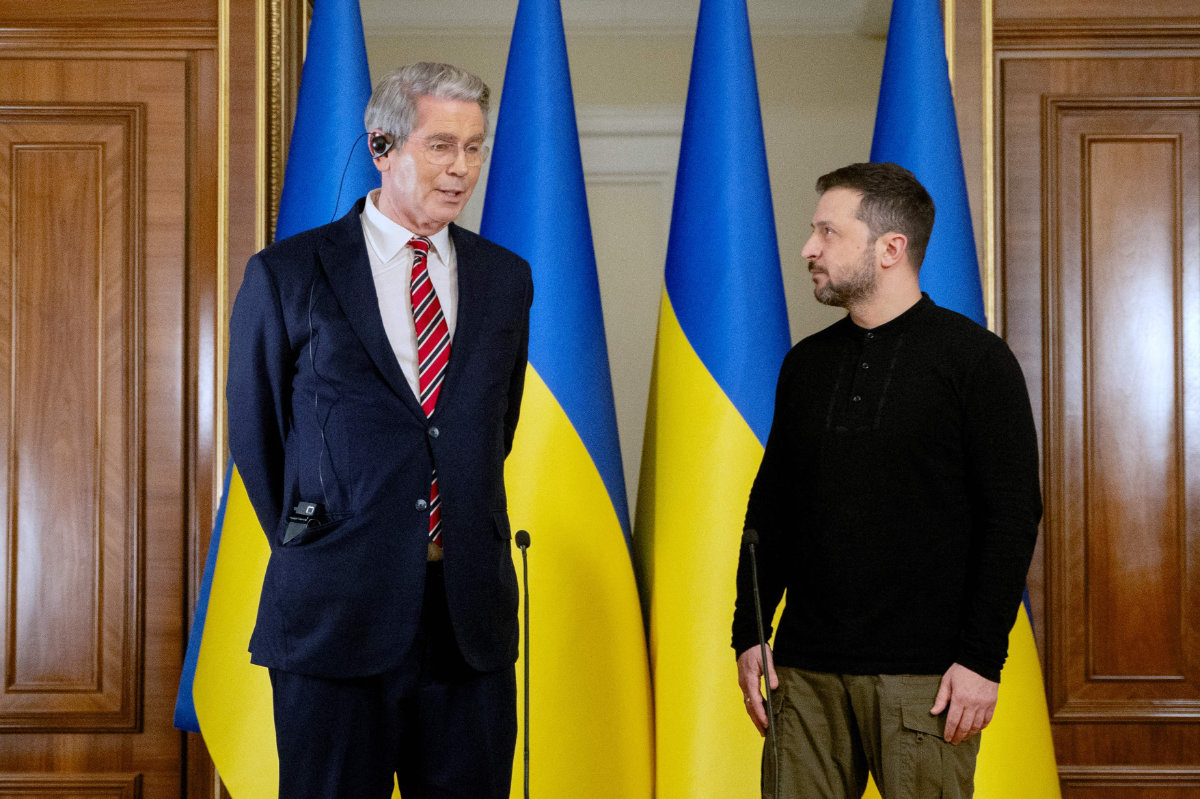ROME: Ukrainian President Volodymyr Zelensky was city-hopping across Europe on Thursday to promote a “victory plan” that he said “aims to create the right conditions for a just end to the war” against Russia, detailing the proposals to European allies after a summit with President Joe Biden was derailed by Hurricane Milton.
Zelensky’s talks in London with British Prime Minister Keir Starmer and NATO Secretary-General Mark Rutte were quickly followed by another meeting in Paris with French President Emmanuel Macron, who just the previous day sent a strong signal of support for Ukraine by visiting Ukrainian troops being trained in France.
Zelensky posted on X that he “outlined the details” of the Ukrainian victory plan to Starmer and added: “We have agreed to work on it together with our allies.”
Starmer’s Downing Street office said the leaders discussed the blueprint, the challenges for Ukraine of the approaching winter and “how investment in the country’s security today would support Europe’s broader security for generations to come.”
The Ukrainian leader also met Rutte with Starmer. Zelensky posted afterward that they discussed trans-Atlantic cooperation and further reinforcing Ukraine militarily. He gave no details but posted that “these are the steps that will create the best conditions for restoring a just peace.”
Zelensky has yet to publicly present his proposals for victory. But the timing of his efforts to lock in European support appeared to have the looming US election in mind. Former President Donald Trump has long been critical of US aid to Ukraine.
Zelensky had planned to present his blueprint at a weekend meeting of Western leaders in Germany, but it was postponed after Biden stayed home because of the hurricane that struck Florida.
Zelensky then embarked on his whistle-stop tour of European capitals that have been among Ukraine’s staunchest allies outside of the United States.
In Paris, Macron and Zelensky hugged before talks on the plan at the French presidential Elysee Palace. Afterward, Zelensky said “all the details” would come in November and that he’s talking with allies about securing more military aid and permission for Ukrainian forces to carry out long-range strikes.
Kyiv wants Western partners to allow strikes deep inside Russia, using long-range weapons they provide. Some, including the UK and France, appear willing, but Biden is reticent about escalating the conflict.
“The situation looks bleak for all sides,” Tatiana Stanovaya, a senior fellow at the Carnegie Russia Eurasia Center, said Thursday on X. “The West hesitates amid internal divisions, Ukraine struggles while bracing for a harsh winter, and Russia presses forward without any strategic shifts in its favor, yet grows increasingly impatient.”
Later Thursday, Zelensky met in Rome with Italian Premier Giorgia Meloni, who ensured Italy’s full and continued support “at both bilateral and multilateral level in order to put Kyiv in the best position possible to build a just and lasting peace.”
Meloni said the meeting provided an opportunity to discuss the situation on the ground and Ukraine’s “most immediate military, financial and humanitarian needs, as well as the forthcoming diplomatic initiatives and the pathway to bring an end to the conflict.”
She added that Rome will continue to do its part also in the future reconstruction of Ukraine and announced the dates for the next Ukraine recovery conference, which will be held in Rome in July 2025.
Zelensky stressed that his priority is to strengthen Ukraine’s position, with the help of its international partners, to create the necessary conditions for diplomacy.
“Russia is not really looking for a diplomatic path,” he said. “If we are able to implement the victory plan, Russia won’t be able to continue the war.”
Zelensky is scheduled to meet Pope Francis Friday morning for a half-hour audience, the Vatican said. Later in the day, he’ll meet German Chancellor Olaf Scholz in Berlin.
Ukraine relies heavily on Western support, including tens of billions of dollars’ worth of military and financial aid, to keep up the fight against its bigger enemy after almost 1,000 days of fighting since the full-scale Russian invasion began in 2022.
Fearing that crucial help could be in jeopardy due to political changes in donor countries, Ukraine has been building up its domestic arms industry. It also wants to raise more money from taxpayers to pay for the war effort. The Ukrainian parliament passed a bill on second reading Thursday that raises the so-called military tax from 1.5 percent to 5 percent. Some amendments are expected before it becomes law.
Zelensky’s tour comes as Russia continues a slow but relentless drive deeper into Ukraine’s eastern Donetsk region and targets key infrastructure with airstrikes.
Zelensky said Wednesday that the victory plan seeks to strengthen Ukraine “both geopolitically and on the battlefield” before any kind of dialogue with Russia.
“Weakness of any of our allies will inspire (Russian President Vladimir) Putin,” he said. “That’s why we’re asking them to strengthen us, in terms of security guarantees, in terms of weapons, in terms of our future after this war. In my view, he (Putin) only understands force.”
The death toll from a Russian ballistic missile strike on Ukraine’s southern city of Odesa rose Thursday to eight, regional Gov. Oleh Kiper said. It was the latest in a string of assaults on the Black Sea port.
Authorities in Kyiv also announced Thursday that Ukrainian journalist Viktoria Roshchyna died while being in Russian captivity, although the circumstances of her death remained unknown. Moscow admitted detaining Roshchyna, who went missing in 2023 while on a reporting trip to Russia-occupied areas.
Ukraine’s Zelensky city-hops across Europe, promoting ‘victory plan’ to allies
https://arab.news/6ncrz
Ukraine’s Zelensky city-hops across Europe, promoting ‘victory plan’ to allies

- He detailed the proposals Thursday to European allies after a summit with President Joe Biden was derailed by Hurricane Milton





























